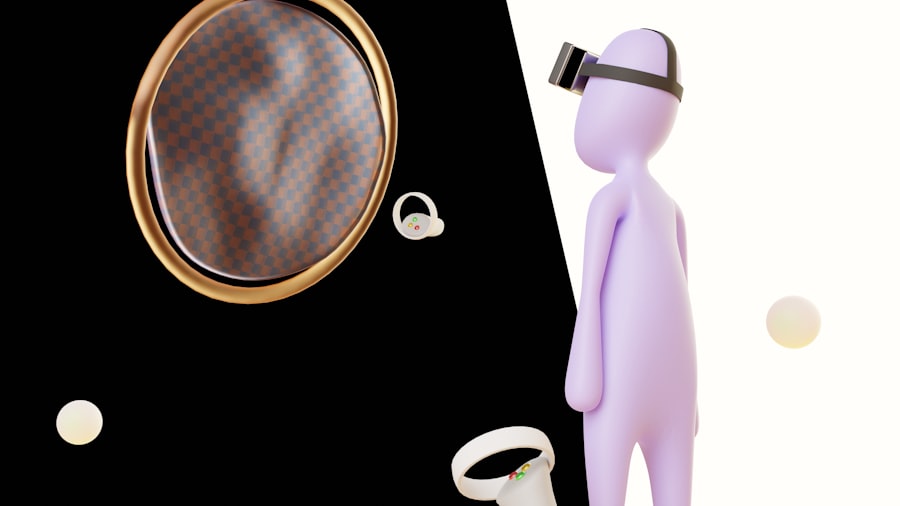Depersonalization Disorder is a mental health condition characterized by a persistent feeling of detachment from oneself. You may experience a sense of being an outside observer of your thoughts, feelings, or body, as if you are watching your life unfold from a distance. This can lead to a profound sense of disconnection, making it difficult for you to engage fully with your surroundings or even recognize your own identity.
The experience can be unsettling and disorienting, often leaving you questioning the reality of your existence. This disorder is not merely a fleeting feeling of being disconnected; it is a chronic condition that can significantly impact your daily life. You might find it challenging to maintain relationships, perform at work, or engage in activities that once brought you joy.
The experience can be isolating, as you may feel that no one else understands what you are going through. Understanding Depersonalization Disorder is crucial for recognizing its effects and seeking appropriate help.
Key Takeaways
- Depersonalization Disorder is characterized by feeling detached from oneself, as if observing one’s own life from the outside.
- Derealization Disorder involves feeling detached from the surrounding environment, as if everything is unreal or distorted.
- Symptoms of Depersonalization Disorder may include feeling like a robot or automaton, emotional numbness, and distorted perception of time.
- Symptoms of Derealization Disorder may include feeling like the world is foggy or dreamlike, distorted perception of objects, and feeling disconnected from one’s surroundings.
- Causes of Depersonalization and Derealization Disorders may include trauma, stress, anxiety, and substance abuse.
What is Derealization Disorder?
Derealization Disorder, on the other hand, involves a sense of detachment from the external world. You may perceive your surroundings as unreal, dreamlike, or distorted. This can manifest as feeling as though you are in a movie or that the world around you is not quite right.
Unlike Depersonalization, which focuses on the self, Derealization centers on the perception of reality itself. You might find that familiar places seem strange or that people appear as if they are not fully present. The experience of Derealization can be equally distressing and confusing.
You may struggle to connect with your environment, leading to feelings of anxiety and fear. This disorder can occur in isolation or alongside Depersonalization, creating a complex interplay of symptoms that can be difficult to navigate. Understanding Derealization Disorder is essential for recognizing its impact on your life and finding effective ways to cope.
Symptoms of Depersonalization Disorder

The symptoms of Depersonalization Disorder can vary widely from person to person, but they often include feelings of unreality regarding oneself. You might experience a sense of emotional numbness or detachment from your thoughts and feelings. This can lead to difficulties in recognizing your own emotions or understanding how you truly feel about situations in your life.
You may also find it challenging to connect with others on an emotional level, leading to feelings of loneliness and isolation. In addition to emotional detachment, physical sensations may also be altered. You might feel as though your body is not your own or that you are observing yourself from outside your body.
This can create a sense of confusion about your identity and lead to anxiety about your mental state. These symptoms can be distressing and may interfere with your ability to function in daily life, making it essential to seek help if you recognize these signs in yourself.
Symptoms of Derealization Disorder
| Symptom | Description |
|---|---|
| Feeling detached from your own body | Feeling like you are observing yourself from outside your body |
| Feeling like the world is unreal | Feeling like the environment around you is foggy, dreamlike, or artificial |
| Emotional numbness | Feeling disconnected from your emotions or feeling like your emotions are muted |
| Distorted perception of time | Feeling like time is passing too quickly or too slowly |
| Difficulty concentrating | Struggling to focus or pay attention to tasks |
When it comes to Derealization Disorder, the symptoms often revolve around altered perceptions of the external world. You may find that familiar environments appear strange or distorted, leading to feelings of disconnection from reality. This can manifest as seeing objects or people in a dreamlike state, where they seem less vivid or tangible than usual.
You might also experience a sense of time distortion, where moments feel elongated or compressed. Another common symptom is the feeling that you are living in a movie or that the world around you is artificial. This can lead to significant anxiety and confusion, as you struggle to reconcile these perceptions with your understanding of reality.
The experience can be frightening, leaving you feeling vulnerable and uncertain about your surroundings. Recognizing these symptoms is crucial for understanding the nature of Derealization Disorder and seeking appropriate support.
Causes of Depersonalization and Derealization Disorders
The causes of Depersonalization and Derealization Disorders are complex and multifaceted. Often, these disorders arise in response to traumatic experiences or significant stressors in your life. For instance, if you have experienced abuse, loss, or a major life change, you may develop these symptoms as a coping mechanism.
Your mind may create a sense of detachment as a way to protect itself from overwhelming emotions associated with these experiences. Additionally, certain mental health conditions such as anxiety disorders, depression, or post-traumatic stress disorder (PTSD) can contribute to the development of these disorders. Substance abuse can also play a role; some individuals may experience depersonalization or derealization during intoxication or withdrawal from drugs or alcohol.
Understanding the potential causes is vital for addressing the underlying issues and finding effective treatment options.
Diagnosis of Depersonalization and Derealization Disorders

Diagnosing Depersonalization and Derealization Disorders typically involves a comprehensive evaluation by a mental health professional. During this process, you will likely discuss your symptoms, medical history, and any significant life events that may have contributed to your condition.
It is essential for the diagnosis to rule out other potential causes of your experiences, such as neurological conditions or substance use disorders. A thorough assessment ensures that you receive an accurate diagnosis and appropriate treatment plan tailored to your specific needs. Understanding the diagnostic process can help alleviate some anxiety surrounding your symptoms and provide clarity on the path forward.
Treatment Options for Depersonalization and Derealization Disorders
Treatment for Depersonalization and Derealization Disorders often involves a combination of therapeutic approaches tailored to your individual needs. Psychotherapy is one of the most common treatment options, with cognitive-behavioral therapy (CBT) being particularly effective for many individuals. Through CBT, you can learn to identify and challenge negative thought patterns associated with your experiences, helping you regain a sense of control over your perceptions.
In some cases, medication may also be prescribed to help manage symptoms associated with anxiety or depression that often accompany these disorders. Antidepressants or anti-anxiety medications may be considered based on your specific situation. It’s important to work closely with a mental health professional to determine the best course of action for your treatment plan.
Coping Strategies for Depersonalization and Derealization Disorders
In addition to professional treatment, there are several coping strategies you can employ to manage symptoms of Depersonalization and Derealization Disorders in your daily life. Mindfulness practices can be particularly beneficial; engaging in mindfulness meditation or grounding exercises can help anchor you in the present moment and reduce feelings of detachment. Focusing on your breath or engaging in sensory experiences—such as touching different textures or listening to calming sounds—can help reconnect you with reality.
Establishing a strong support network is also crucial for coping with these disorders. Sharing your experiences with trusted friends or family members can provide emotional support and validation. Additionally, joining support groups where you can connect with others who understand what you’re going through can foster a sense of community and reduce feelings of isolation.
By understanding Depersonalization and Derealization Disorders—along with their symptoms, causes, diagnosis, treatment options, and coping strategies—you empower yourself to take control of your mental health journey. Seeking help is an important step toward reclaiming your sense of self and reality, allowing you to live a more fulfilling life despite the challenges posed by these disorders.
In exploring the nuances between depersonalization and derealization disorders, it’s essential to understand how these conditions manifest and impact individuals differently. Depersonalization involves a sense of detachment from oneself, as if observing one’s actions from outside the body, while derealization is characterized by a feeling of disconnection from the surrounding environment, making it seem unreal or dreamlike. For a deeper dive into these disorders and their implications, you can read a related article on the topic by visiting Unplugged Psych. This resource provides valuable insights into the symptoms, causes, and treatment options for those experiencing these challenging psychological conditions.
LEARN MORE About Depersonalization & Derealization
FAQs
What is depersonalization vs derealization disorder?
Depersonalization disorder is a mental health condition where a person feels detached from their own body or thoughts. Derealization disorder is a mental health condition where a person feels detached from their surroundings or the world around them.
What are the symptoms of depersonalization vs derealization disorder?
Symptoms of depersonalization disorder may include feeling like an outside observer of one’s thoughts or body, feeling like one is in a dream, or feeling emotionally numb. Symptoms of derealization disorder may include feeling like the world is unreal or distorted, feeling like one is in a fog, or feeling disconnected from one’s surroundings.
What causes depersonalization vs derealization disorder?
The exact cause of depersonalization and derealization disorders is not fully understood, but they are believed to be related to trauma, stress, anxiety, or other mental health conditions.
How are depersonalization vs derealization disorder diagnosed?
Depersonalization and derealization disorders are diagnosed based on a thorough evaluation of the individual’s symptoms and experiences by a mental health professional. There are no specific tests for these disorders, so the diagnosis is based on the individual’s reported experiences.
What are the treatment options for depersonalization vs derealization disorder?
Treatment for depersonalization and derealization disorders may include therapy, such as cognitive behavioral therapy, medication, and stress-reduction techniques. It is important for individuals to seek help from a mental health professional for an accurate diagnosis and appropriate treatment plan.




